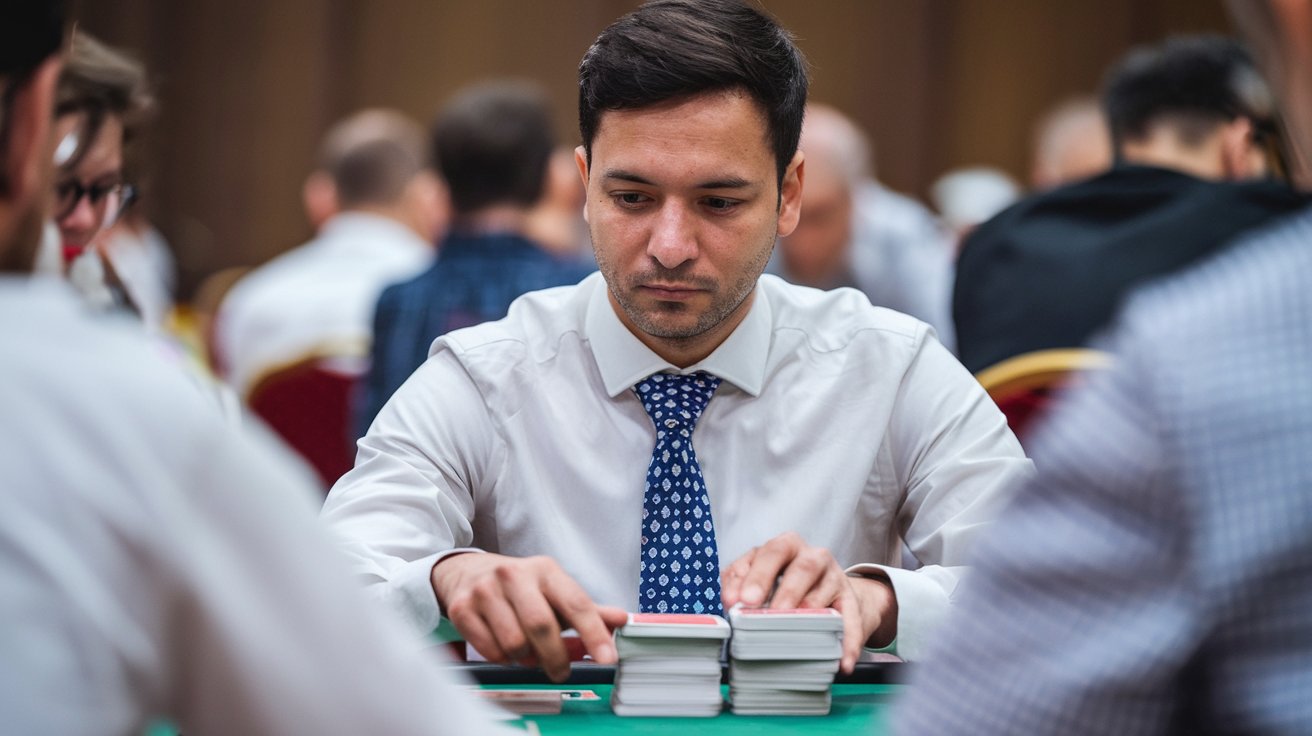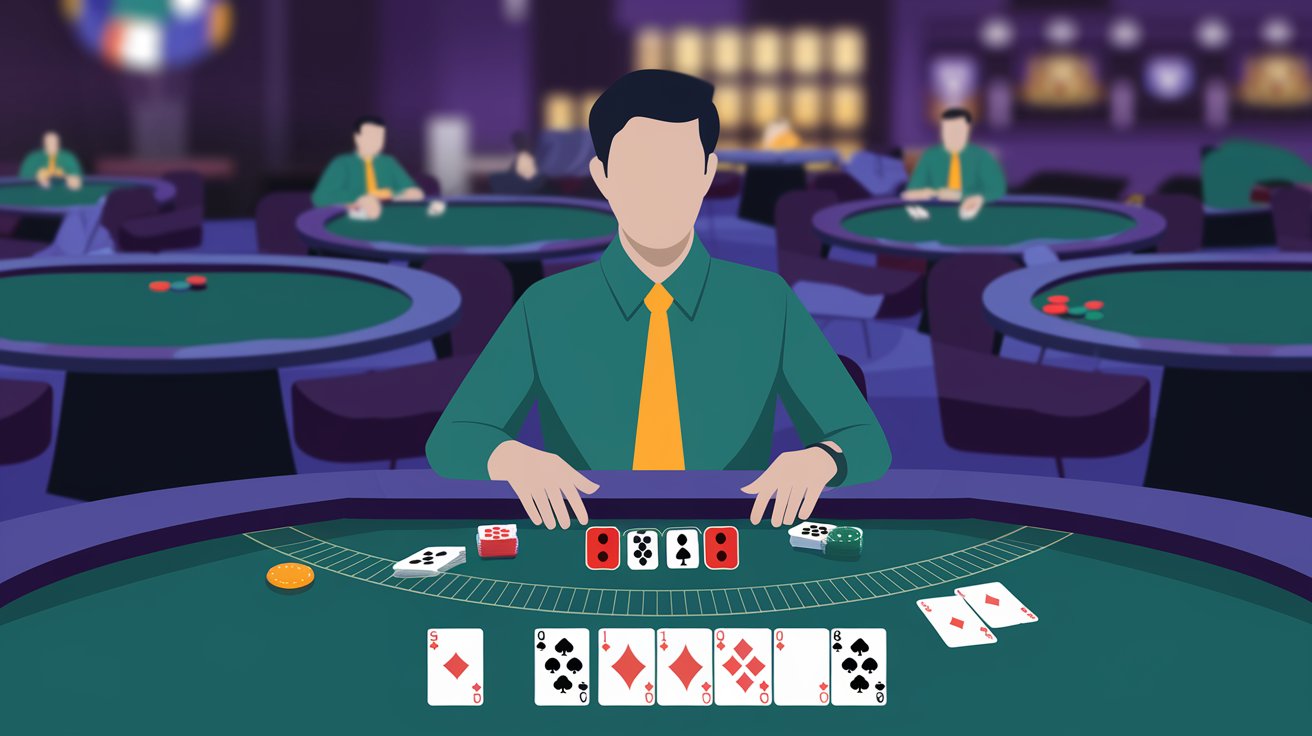In the tense moments of a competitive Rummy game, when your heart races and your palms sweat, the difference between victory and defeat often comes down to one crucial factor: your ability to stay calm under pressure. While card skills and strategic knowledge form the foundation of Rummy expertise, emotional regulation can be the secret weapon that elevates your gameplay to new heights.
Whether you’re playing in a high-stakes tournament, a friendly game with skilled opponents, or simply trying to improve your online Rummy performance, mastering the art of staying calm under pressure can transform your results. This comprehensive guide will explore practical techniques and mental strategies specifically tailored for Rummy players facing stressful situations at the card table.
Why Pressure Affects Rummy Performance

Before diving into solutions, it’s important to understand why pressure impacts our play in the first place.
The Science Behind Pressure in Card Games
When you feel pressure during a Rummy game, your body initiates a stress response—often called “fight or flight”—releasing hormones like adrenaline and cortisol. This biological response evolved to help humans survive physical dangers, but in a card game, it can:
- Narrow your focus, making it harder to track multiple elements simultaneously
- Reduce working memory capacity, hindering your ability to track discards
- Increase impulsivity, leading to hasty decisions
- Heighten emotional reactions to setbacks
- Interfere with logical decision-making processes
In Rummy, these effects can be particularly detrimental because the game requires multitasking, memory, pattern recognition, and strategic patience—all cognitive functions that suffer under stress.
Common Pressure Points in Rummy
Recognizing when pressure typically occurs helps you prepare for these moments:
- Falling behind early: Starting with a difficult hand can trigger anxiety about catching up
- Near-declaration tension: When you or an opponent is close to declaring
- High point exposure: Holding valuable unmelded cards when opponents seem close to finishing
- Critical pick decisions: Deciding whether to take a visible discard that reveals information
- Time pressure: When playing with a clock or in fast-paced online variants
- Financial stakes: When money or tournament advancement is on the line
By identifying these pressure points in your own gameplay, you can develop targeted strategies to maintain composure when they arise.
Physical Techniques for Staying Calm
Your physical state directly influences your mental state. These body-focused techniques can help regulate your nervous system during intense Rummy sessions.
Controlled Breathing for Card Players
The simplest yet most effective technique is controlled breathing:
- Table-appropriate deep breathing: Take slow, deep breaths without being obvious. Inhale for a count of four, hold briefly, then exhale for a count of six.
- 4-7-8 technique between hands: When shuffling or between games, breathe in for four counts, hold for seven, and exhale for eight.
- Breath anchoring: Associate your breathing rhythm with a consistent phrase like “stay focused, play smart.”
Practice these breathing techniques regularly, even during casual games, so they become automatic when pressure intensifies.
Physical Relaxation at the Card Table
Subtle physical relaxation techniques can be employed without disrupting the game:
- Progressive muscle relaxation: Systematically tense and release muscle groups under the table
- Shoulder drops: Consciously lower your shoulders when you notice tension
- Hand relaxation: Between plays, briefly open and close your hands to release grip tension
- Proper posture: Sitting up straight improves breathing and projects confidence
Pre-Game Physical Preparation
How you prepare physically before high-pressure games significantly impacts your ability to stay calm:
- Avoid excessive caffeine, which can amplify anxiety symptoms
- Ensure proper hydration, as even mild dehydration affects cognitive function
- Consider light exercise before important games to release tension
- Arrive early to acclimate to the environment and establish comfort
Mental Strategies for Pressure Situations

Beyond physical techniques, specific mental approaches can help you maintain cognitive clarity during intense Rummy games.
Developing a Pre-Shot Routine
Professional athletes use pre-shot routines to maintain consistency under pressure. Adapt this concept to Rummy:
- Create a brief, consistent routine before making critical decisions
- This might include taking a breath, scanning your hand systematically, and articulating your objective
- Use this routine especially before critical discards or when deciding whether to declare
A consistent routine creates a sense of control and familiarity even in high-pressure moments.
Mindfulness and Present-Moment Focus
Anxiety typically stems from projecting negative future outcomes. Combat this with present-moment awareness:
- Card-by-card focus: Concentrate only on the current decision, not the entire game state
- Process over outcome: Shift attention from “Will I win?” to “What’s the best play right now?”
- Sensory anchoring: Briefly notice physical sensations to pull yourself back to the present
These mindfulness techniques prevent catastrophic thinking and keep your focus where it belongs—on the cards in front of you.
Positive Self-Talk and Cognitive Reframing
The conversation in your head dramatically affects your performance under pressure:
- Replace thoughts like “I’ll never catch up” with “I just need one good sequence”
- Transform “I can’t afford to lose” into “This is an opportunity to demonstrate skill”
- Counter “They always get better cards” with “Random distribution evens out over time”
Create personalized, realistic replacement statements for your common negative thoughts, and practice deploying them when pressure mounts.
Strategic Approaches to Pressure Management
Beyond general mental and physical techniques, specific Rummy strategies can help manage pressure effectively.
The Methodical Hand Assessment
When feeling rushed or pressured, implement a methodical assessment approach:
- Categorize: Sort your hand into definite melds, potential melds, and unconnected cards
- Prioritize: Decide which potential melds offer the best risk/reward balance
- Analyze: Consider what cards you need and their probable locations
- Act: Make your decision based on this structured analysis
This methodical process prevents panic-based decisions and ensures that pressure doesn’t override strategic thinking.
Managing Point Exposure Under Pressure
One of the biggest pressure points in Rummy is holding high-value cards when opponents seem close to declaring. Develop a systematic approach:
- Establish personal thresholds for acceptable point exposure at different game stages
- Create decision rules like “If holding more than 25 points after 5 rounds, discard highest cards unless part of near-complete melds”
- When feeling pressured, default to these pre-established guidelines rather than making emotional decisions
These frameworks provide a safety net when anxiety might otherwise cloud judgment.
Strategic Uncertainty Management
Much of Rummy’s pressure comes from uncertainty. Address this with:
- Information-gathering focus: When anxious, concentrate on collecting data about opponents’ likely hands
- Probability-based thinking: Replace absolute thinking (“I need the 8♥”) with probability assessment (“There’s a good chance of drawing either the 8♥ or the 8♦”)
- Scenario planning: Regularly consider “If X happens, I’ll do Y” to feel prepared for multiple outcomes
By embracing uncertainty as a natural part of the game rather than a threat, you reduce its power to create pressure.
Psychological Preparation for Tournament and High-Stakes Play

Competing in tournaments or playing for significant stakes introduces unique pressures that require specific preparation.
Pre-Tournament Mental Preparation
Develop a comprehensive mental preparation routine:
- Visualization: Mentally rehearse handling difficult situations calmly
- Scenario practice: Play through common pressure situations in practice games
- Expectation setting: Establish realistic goals and accept that perfection is impossible
- Personal pep talk: Create a brief, empowering message to review before competition
This preparation creates mental familiarity with pressure, reducing its impact when you experience it during actual play.
Between-Game Recovery Techniques
In tournament settings, maintaining calm across multiple games is crucial:
- Reset rituals: Develop a brief routine to mentally close one game before beginning another
- Micro-breaks: Use brief moments between games for quick relaxation techniques
- Perspective shifts: Remind yourself of your overall goals rather than fixating on recent results
These techniques prevent pressure and emotions from one game from contaminating your performance in subsequent games.
Learning from Pressure Situations
After high-pressure sessions, conduct a focused review:
- Identify moments where pressure affected decisions
- Analyze what specific thoughts or feelings created difficulty
- Develop targeted responses to those specific pressure triggers
This reflective practice transforms pressure situations from threats into growth opportunities.
Building Long-Term Pressure Resilience for Rummy Players
Beyond in-the-moment techniques, developing lasting pressure resilience requires systematic practice.
Gradual Exposure Training
Systematically expose yourself to increasing pressure levels:
- Start with low-pressure friendly games focusing on staying calm
- Gradually introduce higher stakes or more skilled opponents
- Intentionally practice specific pressure situations
- Use simulated high-pressure scenarios in practice settings
This progressive approach builds confidence through successful experiences under incrementally increasing pressure.
Developing a Personal Pressure Management System
Create a personalized pressure management playbook:
- Identify your specific pressure triggers in Rummy
- Document which techniques work best for each trigger
- Establish clear implementation criteria for when to use each technique
- Regularly review and update based on recent experiences
This systematic approach transforms generic advice into a tailored system addressing your unique pressure response patterns.
The Role of General Lifestyle Factors
Long-term stress resilience extends beyond the card table:
- Regular exercise improves overall stress response
- Adequate sleep enhances emotional regulation
- Proper nutrition supports optimal brain function
- Mindfulness practices strengthen present-moment awareness
These lifestyle factors create a foundation of resilience that benefits your Rummy play during pressure situations.
Common Pressure Management Mistakes in Rummy
Avoid these common errors that undermine pressure management:
- Rushing decisions: Pressure often creates an artificial sense of urgency leading to hasty plays
- Abandoning strategy: Under stress, players frequently abandon their game plan for impulsive decisions
- Fixating on opponents: Pressure can cause over-focus on others’ actions rather than optimizing your own play
- Catastrophizing setbacks: A single bad draw becomes mentally transformed into inevitable defeat
- Emotional discarding: Making discard decisions based on frustration rather than strategy
Recognizing these patterns in your play is the first step toward addressing them effectively.
Advanced Psychological Skills for Elite Rummy Players
For those seeking to master pressure at the highest levels, consider these advanced approaches:
Flow State Cultivation
The “flow state”—a condition of optimal performance where self-consciousness disappears—represents the ultimate pressure antidote:
- Identify your personal conditions for achieving flow in Rummy
- Create pre-game routines that facilitate flow state entry
- Recognize and preserve flow once you’ve entered it
- Gradually extend your ability to maintain flow under increasing pressure
Mental Rehearsal Techniques
Elite performers use sophisticated mental rehearsal:
- Vividly imagine specific high-pressure scenarios with multi-sensory detail
- Mentally practice executing your pressure management techniques
- Visualize successful navigation of difficulty, including recovery from setbacks
- Incorporate physical responses (like breathing patterns) into your mental rehearsal
This integration of physical and mental practice creates neural pathways that activate automatically under pressure.
Conclusion: The Calm Rummy Master
Staying calm under pressure isn’t just an innate talent—it’s a skill that can be systematically developed. By implementing the physical techniques, mental strategies, and Rummy-specific approaches outlined in this guide, you’ll transform pressure from a performance-undermining force into a familiar companion at the card table.
Remember that pressure management in Rummy is highly individualized. Experiment with these techniques, identify what works best for your unique psychology, and gradually build your personal pressure resilience system. Over time, you’ll discover that the moments that once disrupted your play become opportunities to demonstrate your emotional mastery—and to gain an edge over opponents who haven’t developed these crucial skills.
The truly elite Rummy player isn’t merely skilled with cards—they’re skilled with themselves, maintaining strategic clarity and emotional balance even when the stakes are highest. With dedicated practice of these techniques, you’ll join their ranks, demonstrating grace under pressure and discovering new levels of performance when it matters most.

Zareb Saleh is a journalist at Gulf Today and a ghostwriter for Gameoholic, specializing in gaming, technology, and digital culture. With a keen eye for industry trends, he delivers insightful stories that engage and inform readers.




